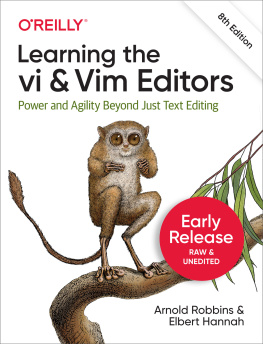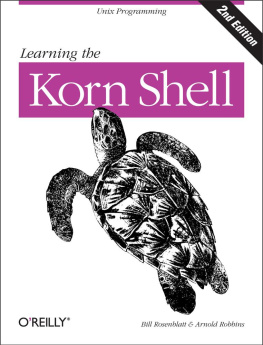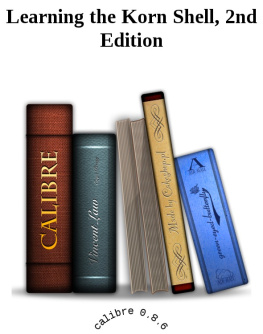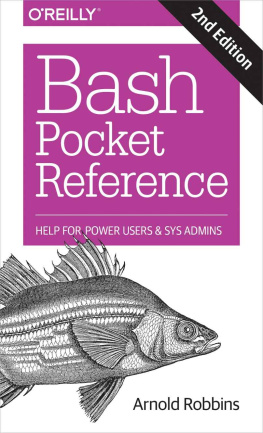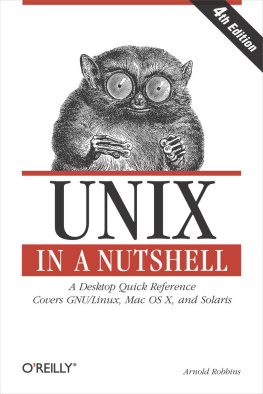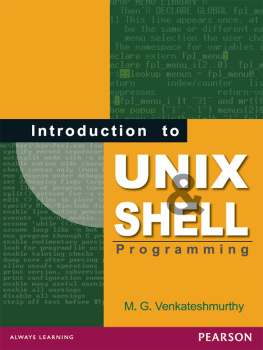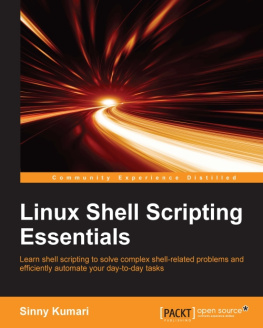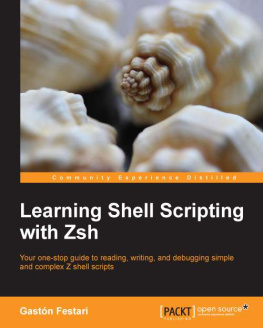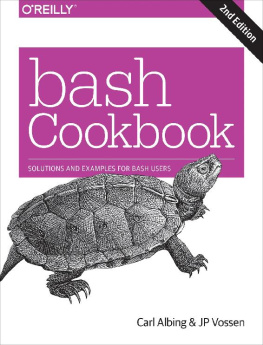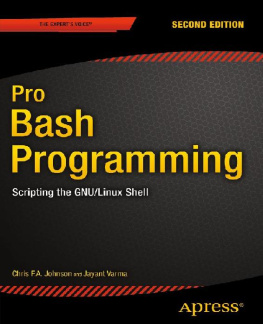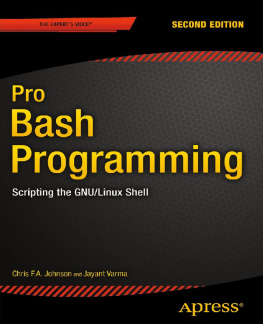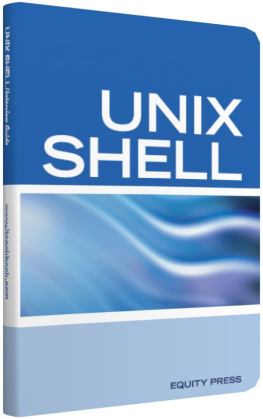Supplemental files and examples for this book can be found at http://examples.oreilly.com/9780596005955/. Please use a standard desktop web browser to access these files, as they may not be accessible from all ereader devices.
All code files or examples referenced in the book will be available online. For physical books that ship with an accompanying disc, whenever possible, weve posted all CD/DVD content. Note that while we provide as much of the media content as we are able via free download, we are sometimes limited by licensing restrictions. Please direct any questions or concerns to .
Foreword
Surely I haven't been doing shell scripting for 30 years?!? Well, now that I think about it, I suppose I have, although it was only in a small way at first. (The early Unix shells, before the Bourne shell, were very primitive by modern standards, and writing substantial scripts was difficult. Fortunately, things quickly got better.)
In recent years, the shell has been neglected and underappreciated as a scripting language. But even though it was Unix's first scripting language, it's still one of the best. Its combination of extensibility and efficiency remains unique, and the improvements made to it over the years have kept it highly competitive with other scripting languages that have gotten a lot more hype. GUIs are more fashionable than command-line shells as user interfaces these days, but scripting languages often provide most of the underpinnings for the fancy screen graphics, and the shell continues to excel in that role.
The shell's dependence on other programs to do most of the work is arguably a defect, but also inarguably a strength: you get the concise notation of a scripting language plus the speed and efficiency of programs written in C (etc.). Using a common, general-purpose data representationlines of textin a large (and extensible) set of tools lets the scripting language plug the tools together in endless combinations. The result is far more flexibility and power than any monolithic software package with a built-in menu item for (supposedly) everything you might want. The early success of the shell in taking this approach reinforced the developing Unix philosophy of building specialized, single-purpose tools and plugging them together to do the job. The philosophy in turn encouraged improvements in the shell to allow doing more jobs that way.
Shell scripts also have an advantage over C programsand over some of the other scripting languages too (naming no names!)of generally being fairly easy to read and modify. Even people who are not C programmers, like a good many system administrators these days, typically feel comfortable with shell scripts. This makes shell scripting very important for extending user environments and for customizing software packages.
Indeed, there's a "wheel of reincarnation" here, which I've seen on several software projects. The project puts simple shell scripts in key places, to make it easy for users to customize aspects of the software. However, it's so much easier for the project to solve problems by working in those shell scripts than in the surrounding C code, that the scripts steadily get more complicated. Eventually they are too complicated for the users to cope with easily (some of the scripts we wrote in the C News project were notorious as stress tests for shells, never mind users!), and a new set of scripts has to be provided for user customization...
For a long time, there's been a conspicuous lack of a good book on shell scripting. Books on the Unix programming environment have touched on it, but only briefly, as one of several topics, and the better books are long out-of-date. There's reference documentation for the various shells, but what's wanted is a novice-friendly tutorial, covering the tools as well as the shell, introducing the concepts gently, offering advice on how to get the best results, and paying attention to practical issues like readability. Preferably, it should also discuss how the various shells differ, instead of trying to pretend that only one exists.
This book delivers all that, and more. Here, at last, is an up-to-date and painless introduction to the first and best of the Unix scripting languages. It's illustrated with realistic examples that make useful tools in their own right. It covers the standard Unix tools well enough to get people started with them (and to make a useful reference for those who find the manual pages a bit forbidding). I'm particularly pleased to see it including basic coverage of awk, a highly useful and unfairly neglected tool which excels in bridging gaps between other tools and in doing small programming jobs easily and concisely.
I recommend this book to anyone doing shell scripting or administering Unix-derived systems. I learned things from it; I think you will too.
Henry Spencer
SP Systems
Preface
The user or programmer new to Unix[] is suddenly faced with a bewildering variety of programs, each of which often has multiple options. Questions such as "What purpose do they serve?" and "How do I use them?" spring to mind.
This book's job is to answer those questions. It teaches you how to combine the Unix tools, together with the standard shell, to get your job done. This is the art of shell scripting . Shell scripting requires not just a knowledge of the shell language, but also a knowledge of the individual Unix programs: why each one is there, and how to use them by themselves and in combination with the other programs.
Why should you learn shell scripting? Because often, medium-size to large problems can be decomposed into smaller pieces, each of which is amenable to being solved with one of the Unix tools. A shell script, when done well, can often solve a problem in a mere fraction of the time it would take to solve the same problem using a conventional programming language such as C or C++. It is also possible to make shell scripts portable i.e., usable across a range of Unix and POSIX-compliant systems, with little or no modification.
When talking about Unix programs, we use the term]
A long-standing analogy summarizes this approach to problem solving. A Swiss Army knife is a useful thing to carry around in one's pocket. It has several blades, a screwdriver, a can opener, a toothpick, and so on. Larger models include more tools, such as a corkscrew or magnifying glass. However, there's only so much you can do with a Swiss Army knife. While it might be great for whittling or simple carving, you wouldn't use it, for example, to build a dog house or bird feeder. Instead, you would move on to using specialized tools, such as a hammer, saw, clamp, or planer. So too, when solving programming problems, it's better to use specialized software tools.
Intended Audience
This book is intended for computer users and software developers who find themselves in a Unix environment, with a need to write shell scripts. For example, you may be a computer science student, with your first account on your school's Unix system, and you want to learn about the things you can do under Unix that your Windows PC just can't handle. (In such a case, it's likely you'll write multiple scripts to customize your environment.) Or, you may be a new system administrator, with the need to write specialized programs for your company or school. (Log management and billing and accounting come to mind.) You may even be an experienced Mac OS developer moving into the brave new world of Mac OS X, where installation programs are written as shell scripts. Whoever you are, if you want to learn about shell scripting, this book is for you. In this book, you will learn:


